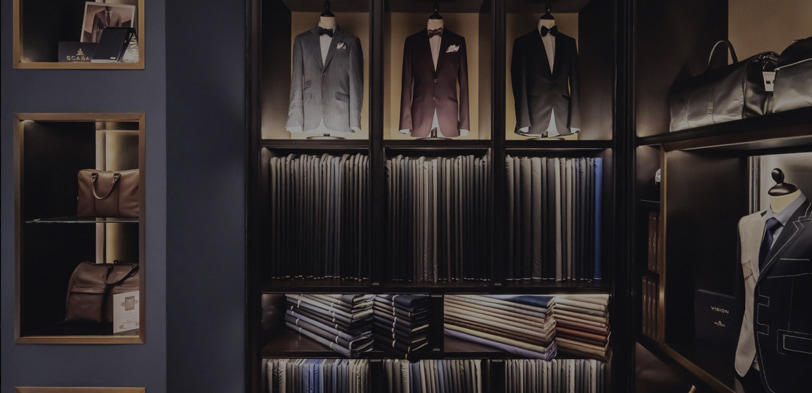Blog
Your Guide to Suit Fabrics
This article has been researched and written by Ariana Amarnani. AI has not been used in producing this article.
 Customers are often amazed, and sometimes even overwhelmed, with a huge variety of suit fabrics that we offer at Collars & Cuffs. We understand that trying to choose can be a tricky process as far as choosing fabrics is concerned, so we’ve created a guide to help you get to the bottom of each fabric and decide which one to pick. Our expert tips will ensure you can make the right selection every time.
Customers are often amazed, and sometimes even overwhelmed, with a huge variety of suit fabrics that we offer at Collars & Cuffs. We understand that trying to choose can be a tricky process as far as choosing fabrics is concerned, so we’ve created a guide to help you get to the bottom of each fabric and decide which one to pick. Our expert tips will ensure you can make the right selection every time.
Our guide provides insights into most popular suit fabrics — wool, linen, cotton, cashmere, velvet, and polyester — along with pro tips for each one. We’ve also covered how to select the correct fabric weight for the climate you live in.
Wool
- Wool is the most popular suiting fabric and for good reasons — it is extremely versatile as is both breathable and wrinkle-resistant.
- Wool is a natural material, so it can keep you cool or warm, based on the temperature, and it also has antibacterial properties, so you don’t have to dry clean your garment after each wear.
- Wool comes in different varieties such as tweed, flannel, merino, and virgin, as well as in various blends, such as silk and wool, linen and wool, or silk, linen, and wool.
PRO TIP: Your first few bespoke suits should always be 100% wool or a wool blend.
Linen
- Linen is a popular fabric choice, especially in this region, as it is an extremely lightweight material.
- It helps the wearer stay cool in high temperatures, which also makes it a great option for a summer suit.
- A big disadvantage of linen suits is that they crease and stain very easily, so you will probably spend a lot of time at the dry cleaners.
PRO TIP: To avoid creasing and high maintenance, choose a wool and linen blend.
Cotton
- Similar to wool, cotton is breathable and flexible.
- Like linen, cotton also tends to crease and stain easily, which is why it’s not a fabric we recommend for formal occasions.
- Compared to wool fabrics, cotton tends to give a more casual look as it lacks a luxury feel.
PRO TIP: If you’re going for a cotton suit, choose one with some lycra in the blend for a slimming yet comfortable look.
Cashmere
- 100% cashmere or cashmere blends are regarded as luxurious suit fabrics.
- The downside of this fabric is that it is too warm for Dubai’s weather and sometimes gives your suits an unwanted shine.
- Cashmere is best for those wishing to wear their suits in temperatures below 10°C.
PRO TIP: We advise our customers to steer clear of cashmere in the workplace, but for pleasure, it can be a great choice.
Velvet
- Velvet suits have made their way back into designer runways over the past few years, thanks to designers like Tom Ford and D&G; the luxurious texture of velvet makes it a fantastic choice for any formal occasion.
- Velvet made from cotton can also be highly breathable, which makes it wearable all year round.
- We advise being wary of what material the velvet is made of, as many velvet fabrics available in this region are made of polyester, which doesn’t breathe and becomes very uncomfortable for the wearer. Collars & Cuffs is one of the very few custom tailors in the region to carry only cotton velvet.
PRO TIP: Limit the use of velvet fabric to just the blazer or accessories. Avoid using this fabric for trousers as it can be unflattering, and opt for a pair of slim-cut wool or cotton trousers instead.
Polyester
- Although polyester tends to be a popular choice for many because of its affordability, it is considered an inferior quality fabric due to its synthetic nature.
- Even though polyester suits don’t crease easily and tend to last longer, they are known for not being breathable.
- They also tend to have a higher shine compared to wool or cotton suits, which can cheapen the look of the garment.
- We do not supply polyester fabrics or blends at Collars & Cuffs, and we recommend that you avoid this fabric entirely.
PRO TIP: If you are buying a polyester suit due to a limited budget or garment durability, we recommend you stick to a polyester and wool blend.
Once you have selected your fabric, you need to consider which weight range best suits the temperature you will be wearing it in. Fabric weights are also known as fabric GSM (grams per square metre), and vary as follows:
- 200 – 250g: Lightweight. Ideal for the peak of summer in Dubai.
- 270 – 310g: Light to mid-weight. This is our most popular weight range as it is perfect for most days in Dubai (excluding summers and for moving from spring to fall.
- 310 – 340g: Mid-weight. The go-to fabric weight for days where you find yourself mostly in air-conditioned temperatures or to wear during Dubai winters.
- 340 – 370g: Heavier mid-weight. A satisfactory choice for those who live in or travel to colder temperatures of 5-15°C. It may be a little too hot to handle in Dubai.
- 390 – 540g: Heavy. This weight-range tends to be a popular choice for people who live in or travel to destinations with temperatures below 0°C.
Since Collars & Cuffs is based in Dubai, where temperatures vary between 20°C to 40°C, the most popular GSM choice for our customers is a GSM of 230-290g.
For more information about bespoke suits, Call us on +971 4 333 7848 | +971 55 497 4342 or email us at suit@collarsandcuffs.ae





0 comments